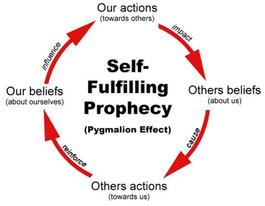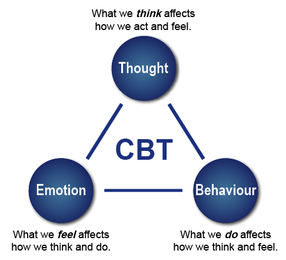 By Caitlin Winkler, PLPC "I can't believe you messed it up! What a failure." "You're not good enough for that." "Nodoby likes you." "Why can't you do anything right?" "The other people are smarter than you." "You have such a miserable life." Wow. Can you believe a person would make such harsh, mean remarks to someone? What would you do if someone said those things to you? Avoid that person? Get into a major argument? End contact altogether. But what about when those words are coming from yourself? Many people have similar thought patterns about themselves. When the thoughts come from within, we tend to accept those words as truth about who we are as a person. We make judgments upon ourselves and rarely challenge or defend our own attacks. When these negative thought patterns happen over time, our esteem, energy, drive, and actions can suffer. We become what we think. Think of this example of a self-fulfilling prophecy: "I am feeling depressed, I look depressed, I act depressed, other people say these things too. I AM depressed." The thoughts rapidly progress from one to another, building on each other. We become that person and take the thought to heart. Instead of "I am a person who deals with depression," the negative pattern might be, "I am depressed." You may say it is just semantics, but there is great power in our thoughts.  With this knowledge, we must begin to battle our thoughts and renew our minds. In Cognitive Behavioral Therapy, counselors look at the cyclical and reciprocal pattern of thoughts, feelings, and behaviors. If thinking is negative, this impacts feelings. When feelings are negative, this impacts behaviors. And when behaviors are negative, this shows the world what's on the inside. Begin to challenge your thoughts! Your thoughts don't own you, but you will become what you think. Think helpful, positive, optimistic, realistic, kind, forgiving, and loving thoughts. Give yourself some grace and share that with others too. Caitlin Winkler is a Provisionally Licensed Professional Counselor at Unlimited Potential Counseling & Education Center in O’Fallon. Caitlin is under the clinical supervision of Emily Kircher-Morris, LPC (MO #2012026754).
0 Comments
 By Caitlin Winkler, PLPC What happens in a therapy room? Counselors use a variety of techniques and strategies geared to help clients reach their goals, but the overarching goal is the same: counselors want to help you get from point A to point B. Think of it this way- After years of eating unhealthily, it can be easy to gain a lot of excess weight. This happens over a long period of time, with consistently unhealthy habits, and a lack of change toward the positive. After gaining the weight, it is easy to become overwhelmed with all the weight needed to be lost. Though the desire is there to change, the action may not be. At this point, people can choose to stay where they are or change years of unhealthy habits and patterns. Some may join a gym, find a trainer, or join an accountability group. For those who train their bodies to eat healthier, exercise, and work towards their goals, change can be seen as they continue their healthy choices. This takes intentional effort, energy, and, possibly, a lot of time. In counseling, the process is the same. Counselors are like your trainer at the gym. With possibly years of unhealthy thinking patterns, choices, and behaviors, it can be extremely difficult to re-train the brain and lose that excess weight! But, just like in physical training, counseling can create a new and healthy mindset to help you overcome your anxiety, depression, and more. Counseling is not always an easy, process. Just like a killer workout at the gym, it takes work and perseverance. But, the time, effort, and energy is worth it in the end! Caitlin Winkler is a Provisionally Licensed Professional Counselor at Unlimited Potential Counseling & Education Center in O’Fallon. Caitlin is under the clinical supervision of Emily Kircher-Morris, LPC (MO #2012026754). |
Archives
August 2021
Categories
All
|
 RSS Feed
RSS Feed